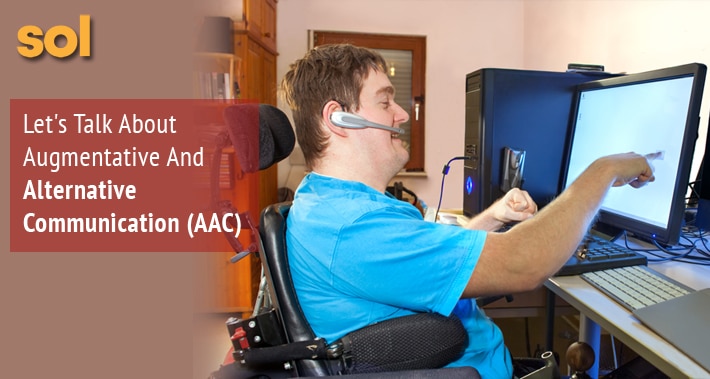
Let’s talk about augmentative and alternative communication.
It’s a great tool to use at any age to improve your communication abilities.
There are many styles and types of augmentative and alternative communication (AAC) that your speech therapist can recommend to you based on their evaluation.
Plus, it doesn’t cause developmental delays and there is no minimum milestone required to use it if you’re considering one for your child.
There are a number of different situations where AAC is useful, including in autism spectrum disorder speech therapy.
Now, let’s find out more.
What Is Augmentative And Alternative Communication?
Augmentative and alternative communication is a tool to help you communicate without speaking.
You can use AAC at any age that you’re having trouble communicating.
Your time using it can also be short term, or long term.
It can be roughly broken down into two main parts:
- Augmentative communication adds to your speech
- Alternative communication is an alternative to speech
There are many different types of augmentative and alternative communication.
At the most basic level writing, drawing, gestures, facial expressions, and pointing are all types of augmentative and alternative communication.
Other options include using an app on a tablet to communicate or using a computer ‘voice’, which is also known as a speech-generating device.
These can be broken down into two main groups.
Unaided AAC
Unaided AAC uses no external tools for communication.
It relies entirely on your motor control and can include facial expressions, body language, finger spelling, gestures, manual signs, vocalizations, and verbalizations.
Aided AAC
Aided AAC requires the use of external tools.
These can be either electronic or non electronic.
Electronic options typically use a computer or smart phone and include communication apps, text to speech features, and texting.
Non electronic options include objects, pictures, photographs, visual schedules, and writing.
You might even find that a blend of multiple types of AAC makes the most sense for you or your child.
That’s okay.
You and your therapist will know what makes the most sense.
Who Uses AAC?
Anyone can use AAC if they are having trouble communicating with their current abilities.
If your current method restricts or impairs the quality and quantity of your interactions with others, AAC can help.
It’s used in both adult speech therapy and pediatric speech therapy in a variety of different scenarios.
In particular, if you or your child is dealing with one of the following speech disorders, your speech pathologist may recommend AAC:
- Developmental delays
- Apraxia of speech
- Cerebral palsy
- Autism spectrum disorder
- Traumatic brain injury
- Stroke
- Aphasia
- ALS
- Parkinson’s disease
What Is A Speech Therapist’s Role With AAC?
Your speech therapist’s role is to evaluate your needs and decide if you or your child need AAC based on certain criteria including:
- To facilitate natural speech
- To substitute verbal speech, writing, or expressive language
- To facilitate more appropriate alternate behaviors
- The length of time required for augmentative and alternative communication
The goal is for your speech therapist to help you find the tool that works best for you.
They will also help you understand which options are covered by your insurance, and those which are not.
They could also collaborate with other professionals if your physical abilities impact how you can access your augmentative and alternative communication.
Some examples include physical therapists and occupational therapists.
Now, the first thing your speech therapist will do is complete a thorough speech and language assessment in order to evaluate your needs.
The things they’ll consider include:
- The effectiveness of your current method of communication
- Your ability to answer to yes or no questions
- Your ability to follow commands
- Your ability to point when given an prompt
- Your current method of expressing communicative intent
Then, your speech therapist will draft a comprehensive program for you that will maximize the efficiency and effectiveness of your communication based on their assessment.
Once you are set up with the right AAC, you or your child should be able to:
- Develop your functional communication
- Develop your speech production and understanding
- Develop your social communication
- Develop your language and literacy skills
Does Using AAC Cause Developmental Issues?
A very common question is whether using augmentative and alternative communication causes developmental issues.
The answer is no.
It does not does not slow down or cause developmental issues – research supports this claim.
A 2006 review of 6 studies reviewed 27 cases people who used AAC and had developmental disabilities.
They found that of the cases reviewed, 89% saw improvements in speech, 11% saw no noticeable difference, and none of them saw decreases in speech abilities.
A 2008 review found similar results.
Instead, using AAC stimulates development and continues to help you improve your language capabilities at any stage in your life.
Book Your Appointment With Sol Speech & Language Therapy Today
You can see that AAC can be an important tool to support your communication abilities.
Our licensed therapists can help you to figure out which type of AAC is the best match for you after their initial evaluation.
Plus, it’s important to note that if you’re looking into augmentative and alternative communication for your child, there’s no milestone prerequisite in order to use one.
Any time is a good time.
It will stimulate their development and ensure they continue to learn as they grow.
Book an appointment with Sol Speech and Language Therapy today to get started.
6448 E Hwy 290 Suite E-108,
Austin, TX 78723
(512) 368-9488
» https://g.page/r/CfRfhOpEQm7BEAE
Sol Speech & Language Therapy
555 Round Rock W Dr E-221,
Round Rock, TX 78681
(512) 808-3953
» https://g.page/r/Cb5pwCTosSEfEBM
Sol Speech & Language Therapy offers personalized skilled intervention to those struggling with their speech and language skills. Services offered include screening, consultation, and comprehensive evaluation. We also provide one-on-one and/or group therapy for speech sound disorders, receptive/expressive language delay/disorder, stuttering/cluttering, accent reduction, and much more.